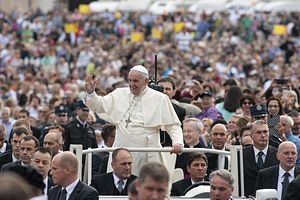In an awkward coincidence, Washington D.C. played host to two influential state leaders last week. Pope Francis arrived in his inaugural trip to the United States, while President Xi Jinping made his first visit over as China’s supreme leader, having crisscrossed from California to Iowa on six occasions prior.
As expected, the pope garnered much more U.S. media attention than China’s president, with Francis outshining Xi in almost every platform. The Chinese were hardly ignorant of this, with a Chinese diplomat stating bluntly, “[the Pope’s] a rock star.” Chinese “netizens” grumbled about how the United States’ adoring focus on the Pope would compromise the success of Xi’s trip.
With all of this circulating in the background, it is unsurprising that the Chinese delegation took all means possible to distance themselves from the pope. Xi lingered in Seattle to make sure that the Pope had left D.C. before he himself touched down, and the Chinese state media ensured page-to-page coverage of Xi’s visit with hardly a peep about the Pope.
Adding to the awkwardness is that fact that the PRC-Vatican relationship has been riddled with tension since its earliest days. China has had no official relations with the Holy See since the Communist Party takeover in 1949, during which Catholic missionaries were expelled from the country and Catholicism was vilified as a product of Western imperialism.
Although the Communist Party allows the Roman Catholic Church to exist, it exists in incomplete forms: an “official” church answerable only to the Communist Party, and a clandestine underground church that has in the past faced retributions from the state for their activities. The state church, also known as the Chinese Catholic Patriotic Association, has clashed repeatedly with the Vatican, and has had several of its bishops excommunicated after being appointed without the Vatican’s approval.
As with all the others on the short list of states that have recognized the Republic of Taiwan (ROC) over the People’s Republic, the Vatican is largely brushed off by China. Its size and geographical position has had little to offer the second largest economy in the world. The Chinese Catholic community is estimated at just over 12 million, a significant but hardly consequential number.
This being said, China’s relations with the Vatican has shown some signs of warmth — the most notably when Pope Francis and Xi exchanged correspondence after their almost simultaneous ascensions to power in March 2013. In an official release by the state media, China expressed the hope that “the Vatican makes joint efforts with China to create conditions for the improvement of bilateral ties under the leadership of the new pope.” Another possible sign of goodwill: the Chinese granted the pope permission to use their airspace when he flew to South Korea last year.
The pope has repeatedly expressed a desire to visit China — as recently as two days ago he said that he “loved the Chinese people” — but has not yet received a response from the Chinese government. With the pope transitioning from a purely moral-spiritual voice to one with global political resonance, China may want to reconsider its stance. If an official visit were to happen, however, China would be forced to confront its relations with domestic religious groups and seriously re-evaluate its stance on Catholicism in China.
Meanwhile, the pope barely factors into the realm of consciousness of the ordinary Chinese. The pope is hardly ever discussed outside of the Catholic community, and even then only when there is a direct attack to the Chinese national image.
Fate, however, seems to have its own insinuations. Both Xi and Francis were elected in March 2013, and both had their inaugural visit to the U.S. in the same week. There’s still a long way to go before China-Vatican relations improve that far, but we may yet see the pope touch down in Beijing.

































